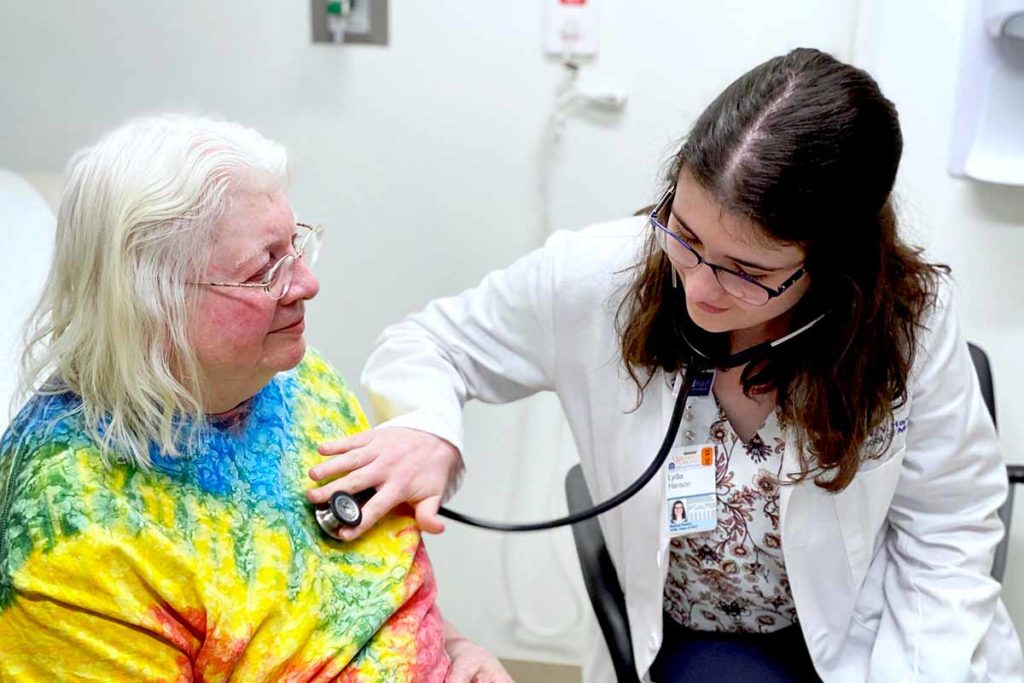2021 was another hard year. But our team of employees, students, and volunteers rose to the occasion, doing whatever it took to help our patients and our community. Here’s one of our favorite stories that helped us make it through 2021.
Not everyone has a positive view of teaching hospitals, also known as academic medical centers. They might assume that their care will come from inexperienced residents or students
However, most of the patients who participate in our voluntary Patient Student Partnership (PSP) program love it. They still have highly-trained primary care providers and specialists, but a first-year medical student also joins their care team. That student stays with them for all four years of medical school.
This helps the students:
- Observe the progression of chronic illnesses, like diabetes
- Learn how to build and maintain doctor-patient relationships
- See the patient’s point of view and learn how to advocate for their patient
In turn, patients tell us that they learn even more at their appointments when their doctor also has to explain a procedure, medicine, or rationale to the student in the room. And they often come to view the students as friends.
Students work with patients throughout UVA Health and the community. Meg Keeley, MD, School of Medicine interim senior associate dean for education, notes that some students are passionate about special patient populations. They may work with children who have developmental disabilities or adults who are homeless, speak primarily Spanish, or are homebound.
The School of Medicine’s Class of 2022 is the first to participate in the program for all four years of their medical education. This year, they’re:
- Serving as mentors to first-year medical students
- Learning about handing off a patient’s care to someone else
Virtual Care During COVID
After the COVID-19 pandemic began, many appointments shifted from in-person to virtual. Video chat tools like Zoom allowed patients and providers to see each other without being in the same room. This allowed the students to more easily check in with their patients.
Medical student Lydia Hanson had been part of Patricia Otterness’ care team for more than a year when the pandemic hit. They spoke almost daily. Pat told UVA Today that that contact was “invaluable.”
“Not so much medically as socially,” she adds. “Having an interesting young person to share my concerns and joys with has been a delight. I can tell her my medical problems or share old memories with her. I can send her photos of my garden, or of my grandchildren. I feel that I know who she really is, and that she knows me, too.”
Hanson agrees. She values her friendship with Pat. But the patient student partnership program also teaches her valuable skills that she can’t learn in a classroom. “I think (it) sort of pulls back the curtain on what day-to-day life can be like for patients dealing with chronic illnesses,” she says.
Keeley says that through the program, students also:
- Organized volunteer student efforts to provide virtual social support to chronically ill patients, who are at high risk for isolation
- Shared COVID vaccine information with patients and helped them navigate complex online vaccine signup systems and get appointments
More recently, Pat needed quite a few tests, including two echocardiograms, and she’s visiting several specialists. She began wearing a glucose monitor and is struggling with severe pain. “You can see why having a medical student to talk to has been such a wonderful help through it all,” she says.
By the Numbers: The Patient Student Partnership Program
Want to Get Involved?
To be part of the program, patients must receive care at UVA and meet other requirements.
This fall:
- About 530 patients are part of the program
- Some are now working with their third medical student
- When School of Medicine administrators asked already participating patients if they would work with a new student, about 74% said yes
Aaliyah Meade, a second-year medical student, says the program is one of the best parts of her experience as a UVA medical student.
“My PSP experience has taught me to never forget about the full story behind every patient I meet,” she says.
